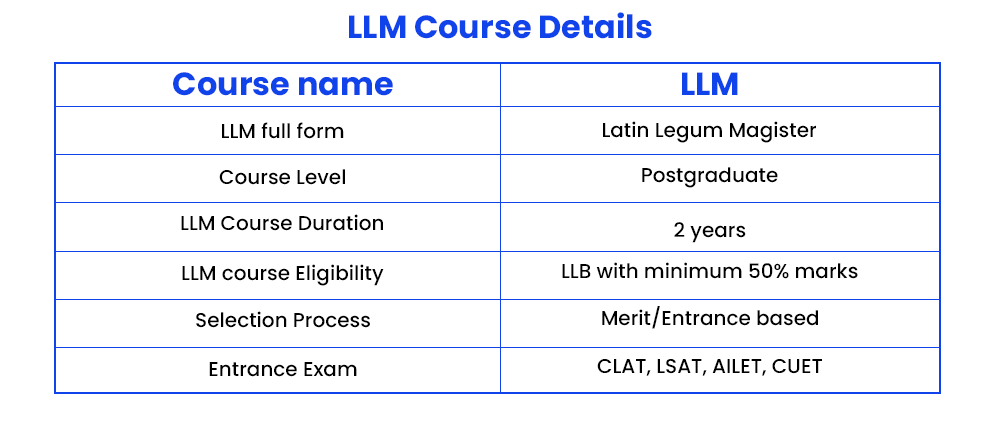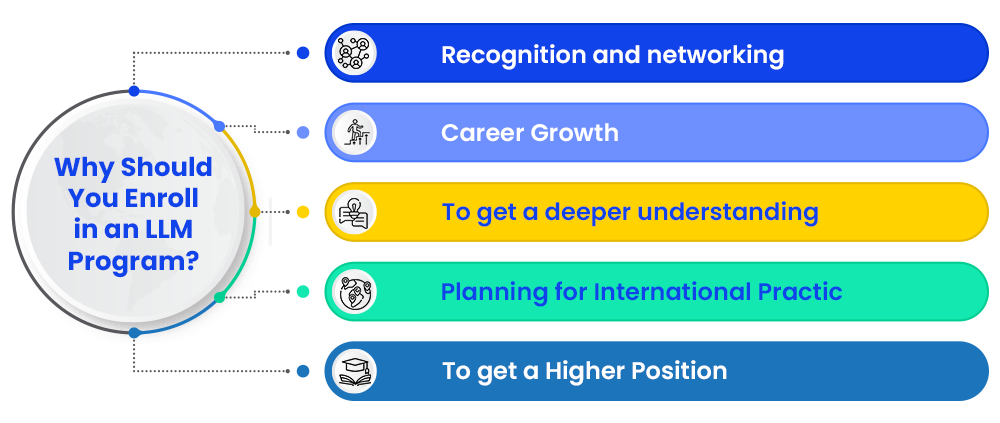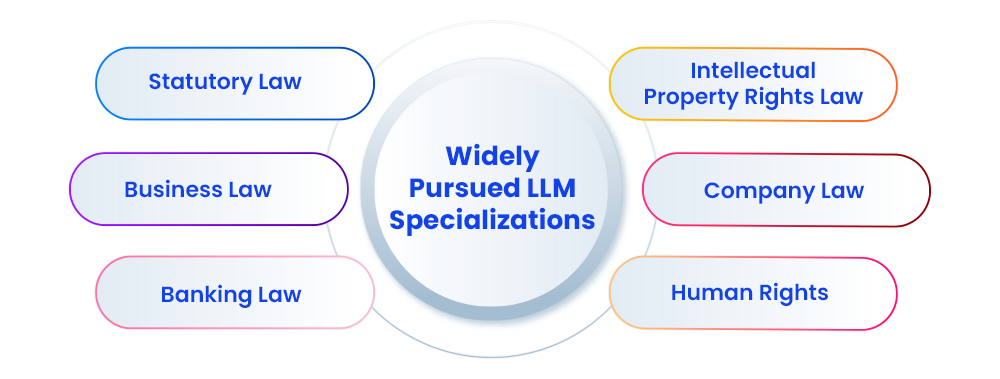Expert Interviews
- University Reviews
- Career Guide
 Video Counseling
Video CounselingImportant Facts
- Ask any Question - CV Forum

LLM Fees Structure - College & Specialization Wise [2026]
Sonika Jan 22, 2026 1.5K Reads

LLM stands for Latin Legum Magister, a Latin term for Master of Law. Generally, the course duration varies from 1 to 2 years. Generally, the average fee of an LLM course ranges between INR 1-5 Lakhs. Multiple roles can be performed by the LLM graduate like research & legal writing and drafting. To get admission to the LLM program, students must have completed their bachelor’s degree in the law field with a minimum of 50% aggregate mark. They must have completed their bachelor’s degree from any recognized law school or university. This program will help you to enhance your skills like research skills, communication skills, critical thinking skills, time management skills, analytical skills, problem-solving skills, and more. Let's explore different entrance exams and universities with their fee structure.

There are traditional LLM regular courses, and now comes the LLM 1-year program designed for working professionals or legal professionals with some experience. So, let’s look at the universities offering the 1-year LLM program and their fees.
|
LLM 1-year program fees for various institutions |
|
|
Institutions |
Total Fees |
|
Jindal Global Law School (Blended Learning Program) (Specialization including Corporate & Financial Law, AI and Emerging Technologies, Intellectual Property & Technology Law, and Dispute Resolution) |
INR 3,50,000 |
|
National Law University, Delhi |
INR 1,25,000 |
|
Lovely Professional University |
INR 1,60,000 |
|
Symbiosis Law School International, Pune |
INR 2,50,000 |
|
NLU, Kolkata |
INR 1,39,000 |
|
UPES |
INR 2,79,000 |
Top 5 LLM Universities and their fee
Multiple universities are offering LLM programs in India, let’s check out the top 5 LLM offering Universities with their annual Fee.
|
University/College |
Course Fee (Per Annum) |
|
National Law School of India, Banglore |
INR 1.8 Lakhs - INR 2 Lakhs (https://www.nls.ac.in/wp-content/uploads/2020/09/Fee-Structure-for-LLM.pdf) |
|
Symbiosis Law School, Symbiosis Internationa, Pune |
INR 2.5 Lakhs (https://www.symlaw.ac.in/llm-admission-process) |
|
National Law University, Delhi |
INR 1.25 Lakhs (https://nludelhi.ac.in/wp-content/uploads/2024/07/LLM-Pro-2024-25-Brochure.pdf) |
|
School of Law, UPES |
INR 2.79 Lakhs (https://www.upes.ac.in/admissions/fee-structure) |
|
Sharda School of Law, Greater Noida |
INR 1.6 INR (https://www.sharda.ac.in/programmes/llm-corporate-law/#requirements) |
Let’s explore more of the Government Universities offering LLM regular programs:
|
Top Government Universities offering LLM program |
|
|
Institutions |
Total Fees |
|
Jamia Milia Islamia |
INR 15,000 - INR 62,500 |
|
BHU |
INR 12,000 - INR 15,000 |
|
Punjab University |
INR 30,000 - INR 40,000 |
|
Dr. Ambedkar Government Law College, Chennai |
INR 70,000 - INR 80,000 |
|
Faculty of Law, Delhi |
INR 12,040 |
After looking at the government colleges and universities, let’s look at the private universities offering LLM courses. Below is the list for the same along with their fee:
|
Top Private Universities offering LLM program |
|
|
Institutions |
Total Fees |
|
Mangalayatan University |
INR 25,000 - INR 6,00,000 |
|
Lovely Professional University |
INR 20,000 - INR 7,00,000 |
|
NLU Odisha |
INR 25,000 - INR 2,01,000 |
|
NLUI Bhopal |
INR 1,10,000 - 2,95,000 |
|
Amity University |
INR 25,000 - INR 6,54,000 |
Eligibility Criteria and Duration
- Eligibility criteria
- Students who wish to pursue LLM courses must have completed their LLB course.
- There is no age restriction or any limit to applying for the LLM program.
- Students must complete their bachelor’s degree with at least 50% aggregate marks.
- Additionally, students who are appearing for or waiting for their results can also apply for the entrance exam, which is taken before admission.
- Duration: Generally, the duration of the LLM program is 2-years. There are some one-year courses as well.
Entrance exams and their fee
To get admission to the LLM program, students need to qualify for the entrance exam conducted either by the government of India or by the university itself. Following are a few major exams:
|
Entrance exam |
Registration fee for the general category (INR) |
Registration fee for reserved category (INR) |
|
CLAT |
4,000 |
3,500 |
|
LSAT |
3,999 |
3,999 |
|
AILET |
3,500 |
1,500 |
|
CUET |
1,000 |
800 |
- CLAT: CLAT is an abbreviated form of the Common Law Admission Test. This is a National level test conducted for the admissions in NLU. For this exam, students must have completed their Bachelor’s degree in the law field with a minimum aggregate mark of 50%. For the General category, the registration fee for CLAT is INR 4000. For SC/ST and EWS categories, the registration fee is INR 3500.
- LSAT: The Law School Admission Test is conducted for 1-year LLM program. To be eligible for this exam, students must have completed their bachelor’s degree from a recognized university. And the score in their bachelor’s program must be no less than 45%. There is no difference in the registration fee for reserved categories and unreserved categories which is INR 3999.
- AILET: The All India Law Entrance Test is conducted by the National Law University, Delhi. The eligibility criteria for applying for the AILET exam, students should complete their Law degree (Bachelor’s degree) from any recognized university. The registration fee is 3500 for the general category and 1500 for reserved categories (SC/ST and PWD)
- CUET: CUET stands for Common University Entrance Test. This exam is conducted by the National Test Agency (NTA) and the registration fee for unreserved categories is INR 1000 and for reserved categories, it is INR 800.
Why should you enroll in an LLM program?
LLM is a program that law enthusiasts wish to pursue. No individual can get a degree without an interest in the law field. Now, the major concern is that other than interest, why should anyone pursue an LLM program? Let’s get clarity on the topic.

- Recognition and networking: Pursuing LLM gives you a greater chance to strengthen your network, which may help you in the future. You can connect with your classmates, guest professors, teachers, and other legal professionals.
- Career growth: LLM allows you to learn new and interesting facts with a deep understanding of law-related topics. This will help you to get a promotion in your profile. This program will help to enhance your skills like legal research skills, communication skills, problem-solving skills, critical analysis, and thinking.
- To get a deeper understanding: LLM is a master’s program and can be pursued by taking any specialization. This program will help you to get a better understanding of a particular domain oe subject. There are numerous specializations from which a student can choose like Company Law, Healthcare Law, Human Rights, Labour Law, Business Law, Environmental Law, Banking Law, and more.
- Planning for International Practice: For students who wish to settle down in any foreign country and start their career in other countries, then LLM can help them get placed or help them go abroad and practice.
- To get a higher position: LLM allows you to learn and understand a particular topic or subject that will help you to get a position in your chosen field. Getting a deeper knowledge of any particular domain can help you to grow in your field.
Widely pursued LLM specializations
- Statutory Law: Statutory Law is a type of law that deals with the breaking of public rules including running a red light, overspeeding, underage drinking, and more. Under this specialization, students get to learn the following subjects: Law and Social Transformation in India, Constitutionalism, Pluralism & Federalism, Indian Constitutional Law- The New Challenges, National Security, Public Order and Rule of Law, Judicial Process, and Judicial Control, and more.
- Intellectual Property Rights Law: IPR laws are such laws that provide you with a global perspective on IPR. this specialization may include the following subjects: Overview of Intellectual Property, Traditional Knowledge and Biodiversity, Commercialization of IP & Licensing, Plant Breeder’s Rights, Copyright and Design Law, and more.

- Business Law: LLM in Business law will help you get a deeper understanding of various aspects of business including corporate governance, finance, sales, and more. Under this specialization, students get to learn about the following topics: Law and Social Transformation in India, Law of Industrial and Intellectual Property, Business Law, Insurance Law, Legal Regulation of Economic Enterprises, Law Relating to Regulatory Authorities, Law Relating to Regulatory Authorities, Commercial Arbitration, and more.
- Company Law: This specialization helps you to understand the deeper meaning of the framework governing companies and some important skills that would help work in corporate law. The subjects for this specialization include Financial Models and Derivatives in a Legal Context, European Procurement Law, Banking and Finance Law, Corporate Social Responsibilities and the Law, and more.
- Banking Law: LLM in Banking law will help you gain knowledge through advanced training in banking and finance. The subjects that students will get to learn are Law and Justice in a Globalizing World, Globalization of Companies, Investment, Foreign Collaboration and Transfer of Technology, Competition Law, Commercial Arbitration, Banking Laws and Institutions, Insurance and Securities, and more.
- Human Rights : This program will help to advance your knowledge of the legal field which focuses on the protection of human rights at different levels (Local, regional, national, and international). Under this LLM program, students will learn a lot of things and laws related to the Humn rights protection where the subjects will be the Concept & Classification of Rights, Concept of Human Rights, Concept of Human Duties, Dialectics of Human Rights, Emerging Concept of Human Rights, Human Duties, Responsibilities & Effectuation, International Obligation, Human Rights & Criminal Justice, and more.
Conclusion
LLM is a post-graduate program that allows students to get some advanced knowledge and a deeper understanding of any particular domain of the legal field. To be eligible to apply for any LLM course, students need to complete their bachelor’s degree in the law field. Additionally, students have to qualify for any of the entrance tests like CLAT, LSAT, AILET, CUET, or any other exam based on the requirement of the University that which they are seeking admission. For every university, there is a difference in fee structures. In this blog, you get to know the fees for the top 5 universities in India.
FAQs (Frequently Asked Questions)
Yes, having a good score in CLAt can get you into one of the best law schools in India. However, CLAT is not necessary to get admission to every university in India. Each university has its requirements which you need to check by visiting the official website of your desired university.
An LLM is a one to two-year master’s program that helps students learn about the different aspects of Law in India. As this is a master’s program, students need to choose one specialization in which the student wants to get the expertise.
Yes, there are multiple government positions and sectors that you can apply for. For example, the Public Service Commission, Lover Judiciary Services, Public Prosecutor, Railway Ministry, Short Service Commission, Law and Justice & Defence Ministry, Central/State Public Units, legal consultant, assistant professor, and more.
Numerous specializations are offered to the students by different universities in India. Although, no university in India offers all the specializations on one campus or under one roof. Each university has a defined number of specializations that they are offering. Following are a few of the most common specializations under the LLM program: Statutory Law, Intellectual Property Rights Law, Business Law, Company Law, Banking Law, Human Rights, Criminal and Security Law, International and Comparative Law, Corporate and Commercial Law, and Family and Social Security Law. however, there are more specializations than this.
Numerous roles and job positions are there that are offered to LLM students. Most of the students pursue an LLM degree to get advanced in their careers. Following are the job positions that are available for LLM law professionals: legal associate, Legal advisor, civil lawyer, legal journalist, criminal lawyer, Human Rights Lawyer, Corporate lawyer, and more.

By Sonika
3 Years of experience/ academic writer/ freelance writer
An academic writing expert with an experience of 4 years.
Every query is essential.
Our team of experts, or experienced individuals, will answer it within 24 hours.
Recommended for you
Tired of dealing with call centers!
Get a professional advisor for Career!
LIFETIME FREE
Rs.1499(Exclusive offer for today)

Pooja
MBA 7 yrs exp

Sarthak
M.Com 4 yrs exp

Kapil Gupta
MCA 5 yrs exp
or



Career Finder
(Career Suitability Test)
Explore and Find out your Most Suitable Career Path. Get Started with our Career Finder Tool Now!
ROI Calculator
Find out the expected salary, costs, and ROI of your chosen online university with our free calculator.
